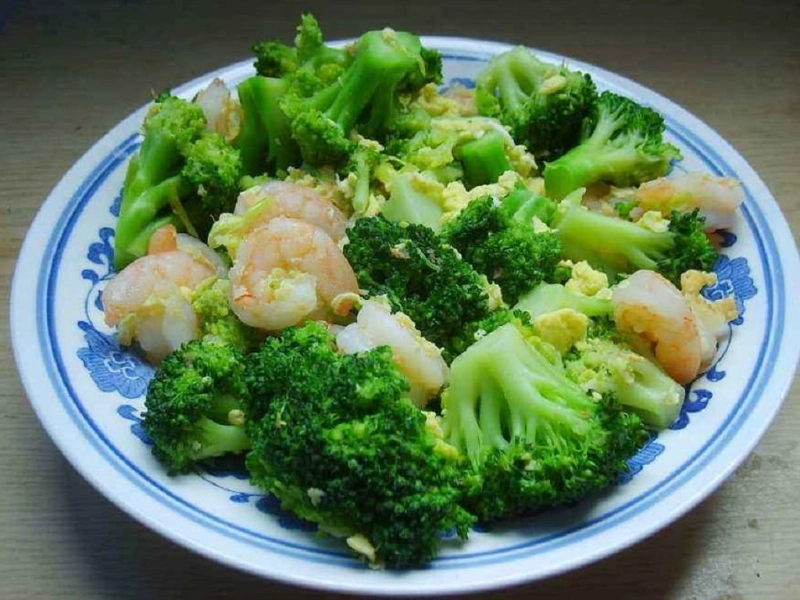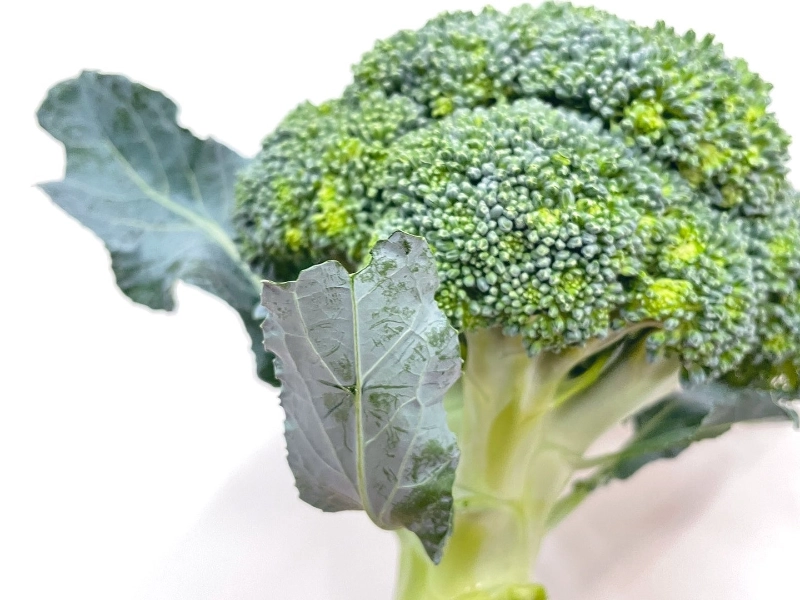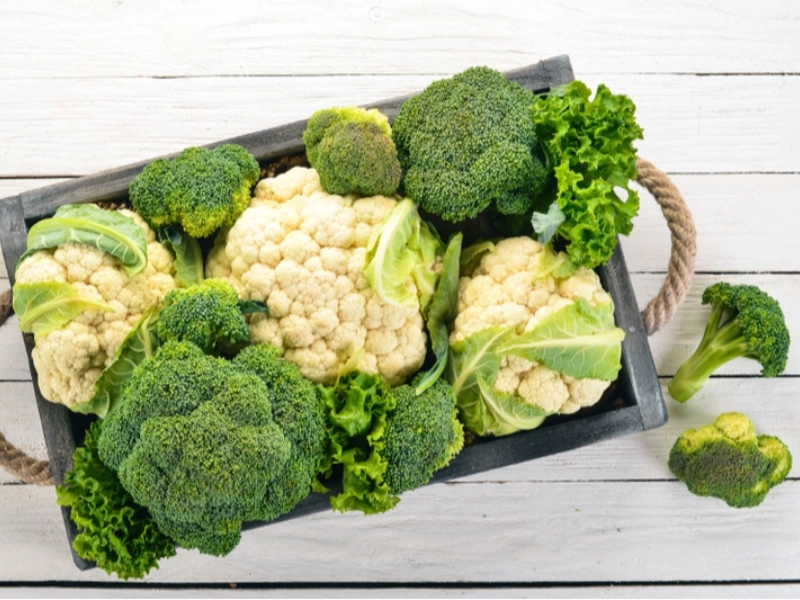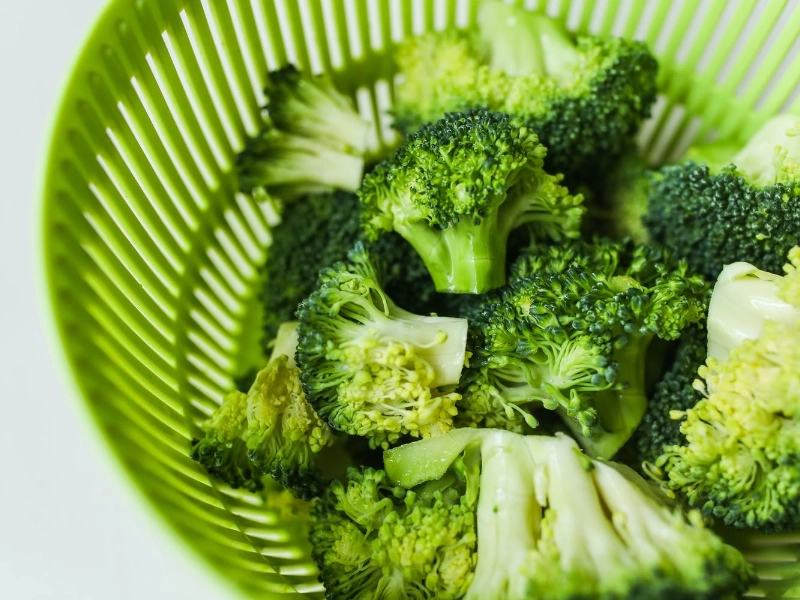Advertisement

Advertisement
1. The Connectivity of Inflammation Although the immune system responds naturally to damage or infection by inflammation, persistent inflammation can cause major medical problems like arthritis, diabetes, and heart disease. Maintaining general health requires an awareness of how nutrition might control inflammation. Among the few foods that could reduce inflammation, broccoli stands out because of its special components and great nutritional value.
2. Powerhouse of Nutrients Essential elements abound in broccoli that help to lower inflammation. It provides quite good amounts of vitamins C and K, folate, and fibre. While vitamin K is vital for bone health and may have anti-inflammatory properties, vitamin C is a potent antioxidant that helps guard cells from oxidative stress. Broccoli's fibre helps digestive health, which is connected to bodily inflammatory levels as well.

3. Their Function and Antioxidants Broccoli's great antioxidant value is one of the main factors explaining its effectiveness in combating inflammation. Antioxidants assist to neutralise free radicals, unstable chemicals capable of damaging cells and starting inflammatory reactions. Sulforaphane is one of the various antioxidants found in broccoli; it has been demonstrated to lower inflammation by preventing the synthesis of pro-inflammatory cytokues. Broccoli is thus a great complement to an anti-inflammatory diet.
4. Sulforaphane: The Star Molecule One chemical in broccoli that has attracted notice for its anti-inflammatory effects is sulforaphane. Studies show that sulforaphane blocks the action of several enzymes that support inflammatory processes, therefore helping to lower inflammation. Regular broccoli intake helps you maximise sulforaphane's ability to prevent inflammation and advance general health.
5. gut health and broccoli Levels of inflammation all across the body are much influenced by the condition of your gut. A good gut flora can lower inflammation and assist control the immune system. High in fibre, broccoli is a prebiotic that feeds the helpful microorganisms in your gut. Broccoli reduces chronic inflammation and supports intestinal health, therefore promoting a healthy immune response.

6. The Part Broccoli Plays in Weight Control Managing inflammation requires a healthy weight since extra body fat can generate inflammatory molecules. For someone trying to control their weight, broccoli is low in calories but high in fibre. Promoting sensations of fullness can help broccoli support a good weight and assist prevent overeating, therefore lowering the risk of inflammation-related health problems.
7. Simple Recipes for Including Broccoli Including broccoli in your diet is basic yet flexible. Raw, roasted, or steamed it will taste great in salads. Including broccoli in soups, casseroles, or stir-fries improves the nutritional worth of your dishes. Try hummus or yogurt-based dips to quickly nibble on raw broccoli florets. The countless opportunities make it simple to take advantage of broccoli's anti-inflammatory properties.

8. Potential Issues Although most people find broccoli to be generally safe and healthful, it is important to wash it completely to eliminate any pesticides or toxins. Eating much of cruciferous vegetables could cause stomach trouble for some people. Key is moderation; so, it is advised to progressively raise your consumption so that your digestive system may adapt.
9.Synopsis Thanks to its rich nutritional profile and unusual chemicals like sulforaphane, broccoli is a great friend in the battle against inflammation. Including broccoli in your regular diet can help you to use its anti-inflammatory qualities to improve general health, control weight, and boost a healthy immune response. Accepting this nutrient-dense vegetable can help you naturally fight inflammation and lead to a better, more colourful existence.

 3. Their Function and Antioxidants Broccoli's great antioxidant value is one of the main factors explaining its effectiveness in combating inflammation. Antioxidants assist to neutralise free radicals, unstable chemicals capable of damaging cells and starting inflammatory reactions. Sulforaphane is one of the various antioxidants found in broccoli; it has been demonstrated to lower inflammation by preventing the synthesis of pro-inflammatory cytokues. Broccoli is thus a great complement to an anti-inflammatory diet.
4. Sulforaphane: The Star Molecule One chemical in broccoli that has attracted notice for its anti-inflammatory effects is sulforaphane. Studies show that sulforaphane blocks the action of several enzymes that support inflammatory processes, therefore helping to lower inflammation. Regular broccoli intake helps you maximise sulforaphane's ability to prevent inflammation and advance general health.
5. gut health and broccoli Levels of inflammation all across the body are much influenced by the condition of your gut. A good gut flora can lower inflammation and assist control the immune system. High in fibre, broccoli is a prebiotic that feeds the helpful microorganisms in your gut. Broccoli reduces chronic inflammation and supports intestinal health, therefore promoting a healthy immune response.
3. Their Function and Antioxidants Broccoli's great antioxidant value is one of the main factors explaining its effectiveness in combating inflammation. Antioxidants assist to neutralise free radicals, unstable chemicals capable of damaging cells and starting inflammatory reactions. Sulforaphane is one of the various antioxidants found in broccoli; it has been demonstrated to lower inflammation by preventing the synthesis of pro-inflammatory cytokues. Broccoli is thus a great complement to an anti-inflammatory diet.
4. Sulforaphane: The Star Molecule One chemical in broccoli that has attracted notice for its anti-inflammatory effects is sulforaphane. Studies show that sulforaphane blocks the action of several enzymes that support inflammatory processes, therefore helping to lower inflammation. Regular broccoli intake helps you maximise sulforaphane's ability to prevent inflammation and advance general health.
5. gut health and broccoli Levels of inflammation all across the body are much influenced by the condition of your gut. A good gut flora can lower inflammation and assist control the immune system. High in fibre, broccoli is a prebiotic that feeds the helpful microorganisms in your gut. Broccoli reduces chronic inflammation and supports intestinal health, therefore promoting a healthy immune response.
 6. The Part Broccoli Plays in Weight Control Managing inflammation requires a healthy weight since extra body fat can generate inflammatory molecules. For someone trying to control their weight, broccoli is low in calories but high in fibre. Promoting sensations of fullness can help broccoli support a good weight and assist prevent overeating, therefore lowering the risk of inflammation-related health problems.
7. Simple Recipes for Including Broccoli Including broccoli in your diet is basic yet flexible. Raw, roasted, or steamed it will taste great in salads. Including broccoli in soups, casseroles, or stir-fries improves the nutritional worth of your dishes. Try hummus or yogurt-based dips to quickly nibble on raw broccoli florets. The countless opportunities make it simple to take advantage of broccoli's anti-inflammatory properties.
6. The Part Broccoli Plays in Weight Control Managing inflammation requires a healthy weight since extra body fat can generate inflammatory molecules. For someone trying to control their weight, broccoli is low in calories but high in fibre. Promoting sensations of fullness can help broccoli support a good weight and assist prevent overeating, therefore lowering the risk of inflammation-related health problems.
7. Simple Recipes for Including Broccoli Including broccoli in your diet is basic yet flexible. Raw, roasted, or steamed it will taste great in salads. Including broccoli in soups, casseroles, or stir-fries improves the nutritional worth of your dishes. Try hummus or yogurt-based dips to quickly nibble on raw broccoli florets. The countless opportunities make it simple to take advantage of broccoli's anti-inflammatory properties.
 8. Potential Issues Although most people find broccoli to be generally safe and healthful, it is important to wash it completely to eliminate any pesticides or toxins. Eating much of cruciferous vegetables could cause stomach trouble for some people. Key is moderation; so, it is advised to progressively raise your consumption so that your digestive system may adapt.
9.Synopsis Thanks to its rich nutritional profile and unusual chemicals like sulforaphane, broccoli is a great friend in the battle against inflammation. Including broccoli in your regular diet can help you to use its anti-inflammatory qualities to improve general health, control weight, and boost a healthy immune response. Accepting this nutrient-dense vegetable can help you naturally fight inflammation and lead to a better, more colourful existence.
8. Potential Issues Although most people find broccoli to be generally safe and healthful, it is important to wash it completely to eliminate any pesticides or toxins. Eating much of cruciferous vegetables could cause stomach trouble for some people. Key is moderation; so, it is advised to progressively raise your consumption so that your digestive system may adapt.
9.Synopsis Thanks to its rich nutritional profile and unusual chemicals like sulforaphane, broccoli is a great friend in the battle against inflammation. Including broccoli in your regular diet can help you to use its anti-inflammatory qualities to improve general health, control weight, and boost a healthy immune response. Accepting this nutrient-dense vegetable can help you naturally fight inflammation and lead to a better, more colourful existence.